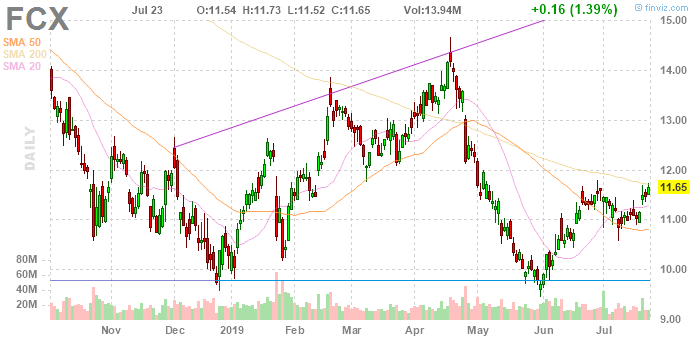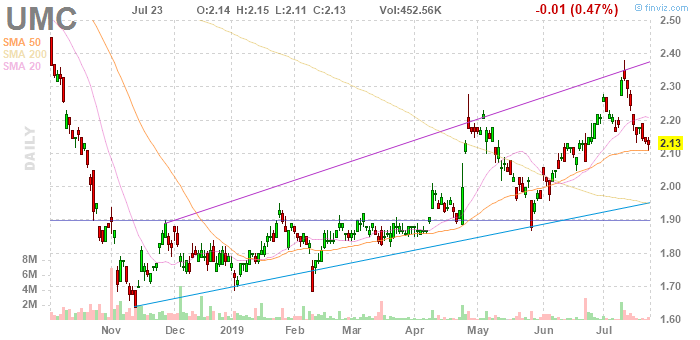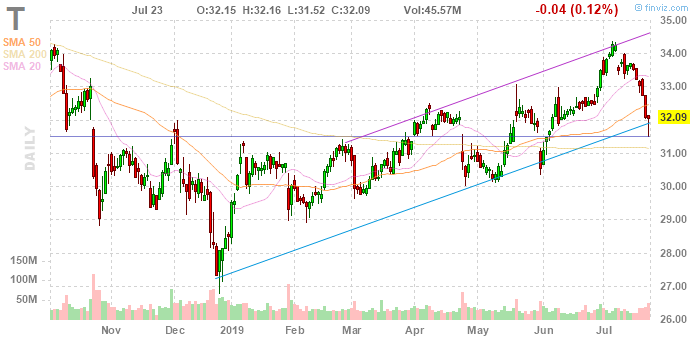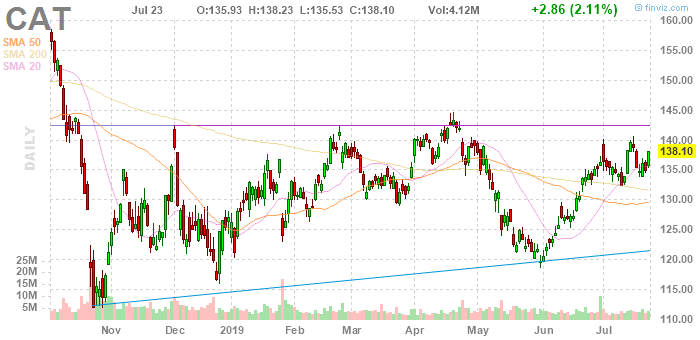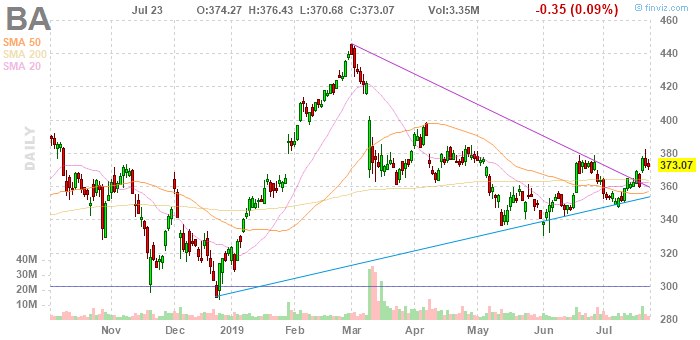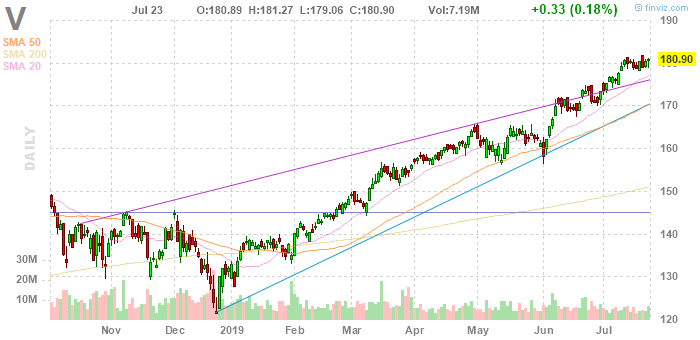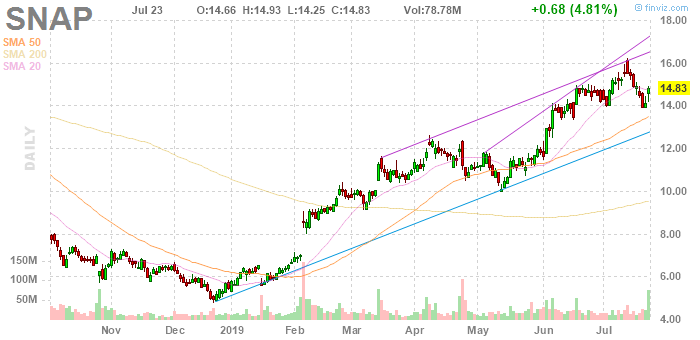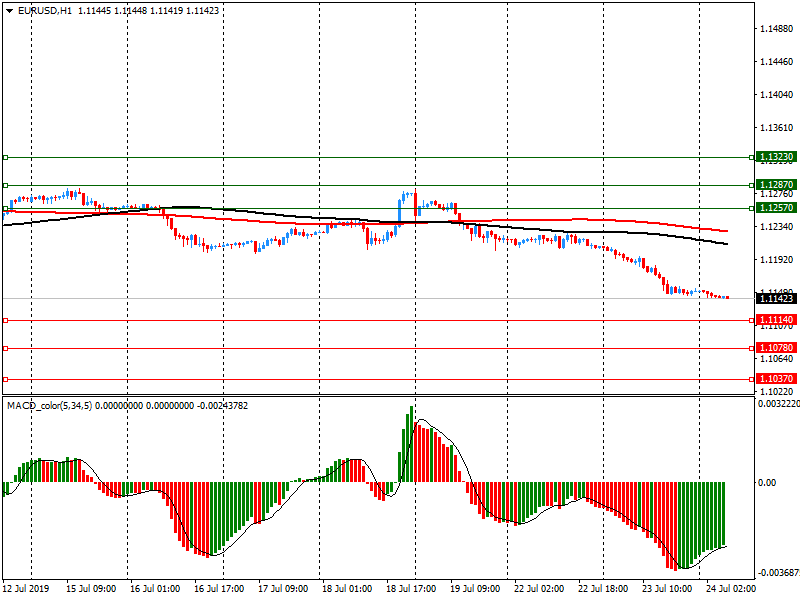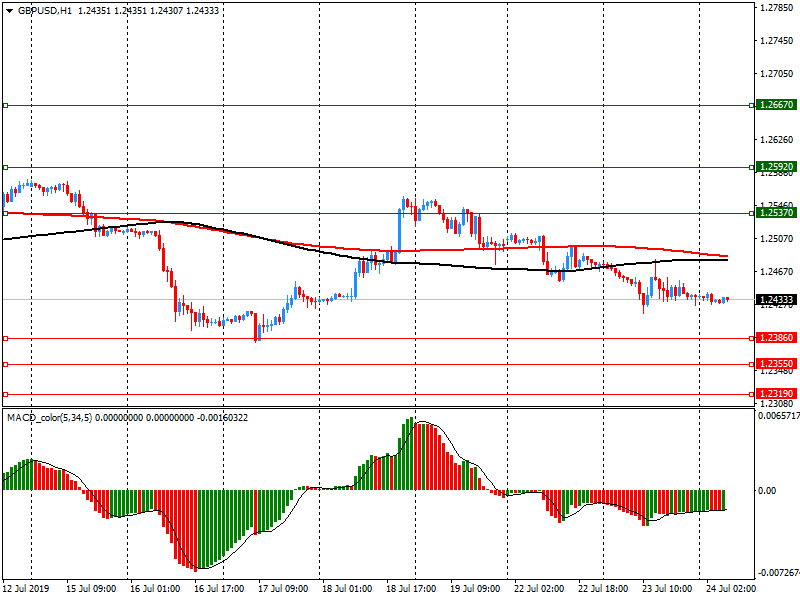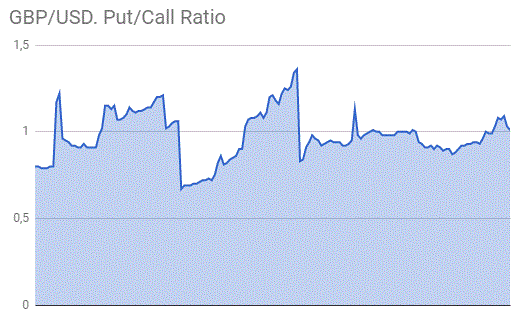- Analiza
- Novosti i instrumenti
- Vesti sa tržišta
Forex-novosti i prognoze od 24-07-2019
| Time | Country | Event | Period | Previous value | Forecast |
|---|---|---|---|---|---|
| 03:05 | Australia | RBA's Governor Philip Lowe Speaks | |||
| 08:00 | Germany | IFO - Current Assessment | July | 100.8 | 100.4 |
| 08:00 | Germany | IFO - Expectations | July | 94.2 | 94 |
| 08:00 | Germany | IFO - Business Climate | July | 97.4 | 97.1 |
| 10:00 | United Kingdom | CBI retail sales volume balance | July | -42 | -10 |
| 11:45 | Eurozone | ECB Interest Rate Decision | 0% | 0% | |
| 12:30 | U.S. | Continuing Jobless Claims | 1686 | 1688 | |
| 12:30 | U.S. | Goods Trade Balance, $ bln. | June | -75.05 | -72.4 |
| 12:30 | U.S. | Initial Jobless Claims | 216 | 218 | |
| 12:30 | U.S. | Durable goods orders ex defense | June | -0.6% | 1.3% |
| 12:30 | U.S. | Durable Goods Orders ex Transportation | June | 0.3% | 0.2% |
| 12:30 | U.S. | Durable Goods Orders | June | -1.3% | 0.7% |
| 12:30 | Eurozone | ECB Press Conference | |||
| 23:30 | Japan | Tokyo Consumer Price Index, y/y | July | 1.1% | 1% |
| 23:30 | Japan | Tokyo CPI ex Fresh Food, y/y | July | 0.9% | 0.8% |
Major US stock indices have predominantly increased, as investors analyzed the new block of quarterly reports of US companies, as well as the announcement of the opening by the US Department of Justice of an antitrust investigation in relation to major technology companies.
Over 25% of the S & P 500 companies have already published quarterly figures for the second quarter. According to FactSet, of these companies, 78% showed higher than expected earnings for the last reporting period.
Nevertheless, the mood remains fragile, including because of the announcement by the US Department of Justice that its anti-monopoly committee is investigating how leading online platforms managed to take a dominant position in the market and whether they are engaged in activities aimed at reducing competition and suppressing innovation. and causing other harm to consumers - and in what way. Although the statement does not contain specific references to companies, the criteria noted indicate Alphabet Inc. (GOOG), Amazon.com Inc. (AMZN) and Facebook Inc. (FB).
Investors also analyzed data for the United States. As reported by IHS Markit, the seasonally adjusted business activity index in the US private sector was 51.6 in July compared with 51.5 in June and remained above the three-year low recorded in May. Service companies have recorded the strongest business growth since April. This helped offset the slowdown in the industrial sector in July.
Meanwhile, the Department of Commerce data showed that sales of single-family single-family homes in the United States increased sharply in June, but sales in the previous three months were revised downward, indicating that the housing market continued to face difficulties, despite more low mortgage rates and a strong labor market. According to the report, sales of new homes rose by 7.0%, to a seasonally adjusted annual level of 646,000 units last month. The May sales pace was revised to 604,000 units from the previously announced 626,000 units. Economists had forecast that sales of new homes, which account for about 11% of sales in the housing market, increased to 660,000 units in June.
Most of the components of DOW recorded a decline (17 of 30). Caterpillar Inc. shares turned out to be an outsider. (CAT; -4.35%). The growth leader was Intel Corp. (INTC; + 2.29%).
Most sectors of the S & P finished trading in positive territory. The sector of conglomerates grew the most (+ 1.6%). The largest decline was shown by the base materials sector (-0.4%).
At the time of closing:
Dow 27,269.97 -79.22 -0.29%
S & P 500 3,019.56 +14.09 + 0.47%
Nasdaq 100 8,321.50 +70.10 + 0.85%
| Time | Country | Event | Period | Previous value | Forecast |
|---|---|---|---|---|---|
| 03:05 | Australia | RBA's Governor Philip Lowe Speaks | |||
| 08:00 | Germany | IFO - Current Assessment | July | 100.8 | 100.4 |
| 08:00 | Germany | IFO - Expectations | July | 94.2 | 94 |
| 08:00 | Germany | IFO - Business Climate | July | 97.4 | 97.1 |
| 10:00 | United Kingdom | CBI retail sales volume balance | July | -42 | -10 |
| 11:45 | Eurozone | ECB Interest Rate Decision | 0% | 0% | |
| 12:30 | U.S. | Continuing Jobless Claims | 1686 | 1688 | |
| 12:30 | U.S. | Goods Trade Balance, $ bln. | June | -75.05 | -72.4 |
| 12:30 | U.S. | Initial Jobless Claims | 216 | 218 | |
| 12:30 | U.S. | Durable goods orders ex defense | June | -0.6% | 1.3% |
| 12:30 | U.S. | Durable Goods Orders ex Transportation | June | 0.3% | 0.2% |
| 12:30 | U.S. | Durable Goods Orders | June | -1.3% | 0.7% |
| 12:30 | Eurozone | ECB Press Conference | |||
| 23:30 | Japan | Tokyo Consumer Price Index, y/y | July | 1.1% | 1% |
| 23:30 | Japan | Tokyo CPI ex Fresh Food, y/y | July | 0.9% | 0.8% |
- I refuse to have checks at the Irish border
- Convinced we can do a deal without checks on the Irish border
- EU nationals living in the UK have certainty to remain here
- We need to be ready to leave EU customs union
The U.S. Energy
Information Administration (EIA) revealed on Wednesday that crude inventories tumbled
by 10.853 million barrels in the week ended July 19. Economists had forecast a
fall of 4.261 million barrels.
At the same time,
gasoline stocks decreased by 0.226 million barrels, while analysts had expected
a drop of 1.421 million barrels. Distillate stocks rose by 0.613 million
barrels, while analysts had forecast an increase of 0.895 million barrels.
Meanwhile, oil
production in the U.S. decreased by 700,000 barrels a day to 11.300 million
barrels a day.
U.S. crude oil
imports averaged 7.0 million barrels per day last week, up by 196,000 barrels
per day from the previous week.
The U.S. Commerce
Department announced on Wednesday that the sales of new single-family homes surged
7.0 percent m-o-m to a seasonally adjusted annual rate of 646, 000 units in June.
Economists had
forecast the sales pace of 660,000 last month.
May’s sales
pace was revised down to 604,000 units from the originally reported 626,000
units.
According to
the report, new home sales in the South, the largest area, increased 0.3
percent m-o-m in June to a 13-month high, while sales in the West climbed
50.4%, recording the biggest gain since August 2010 after 38.5% plunge in May.
Meanwhile, sales in the Midwest tumbled 26.3% to their lowest level since
September 2015, and sales in the Northeast dropped to their lowest level in
eight months.
In y-o-y terms,
new home sales recorded a 3.7 percent drop in May.
Preliminary
data released by IHS Markit on Wednesday indicated that the U.S. private sector
growth hit a three-month high in July, as stronger service sector growth offset a
downturn manufacturing production.
According to
the report, the Markit flash manufacturing purchasing manager's index (PMI)
stood at 50.0 in July, down 50.6 in June. The latest reading was the lowest
since September 2009 and signaled stagnant manufacturing business conditions.
Economists had
expected the reading to increase to at 50.9.
A reading above
50 signals an expansion in activity, while a reading below this level signals a
contraction.
According to
the report, the negative influences on the headline PMI were lower production
volumes, a drop in employment and decreased stocks of purchases.
Meanwhile, the
Markit flash services purchasing manager's index (PMI) rose to 52.2 this month,
from 51.5 in the prior month. The reading signaled the strongest rise in
service sector output since April.
Economists had
expected the reading to increase to 51.7.
Overall, IHS
Markit Flash U.S. Composite PMI Output Index came in at 51.6 in July, up marginally
from 51.5 in the previous month, pointing to the quickest expansion in the
private sector in three months.
Commenting on
the flash PMI data, Chris Williamson, Chief Business Economist at IHS Markit
noted, “The survey data indicated that the economy started the third quarter on
a disappointingly soft footing. The PMIs for manufacturing and services
collectively point to annualized GDP growth of just 1.6%, up only very
marginally from a lackluster 1.5% indicated by the survey in the second
quarter.”
Bert Colijn, the senior economist at ING, notes that loan growth in the eurozone remained stable in June, while the Bank lending survey indicates that credit conditions have tightened.
- "Loan growth to both households and non-financial corporates remained stable in June at 3.3% YoY and 3.8% respectively. As increasing credit growth provides an impulse to GDP, acceleration would be needed for lending to provide a positive contribution to the growth recovery. In fact, the credit impulse for non-financial corporates is now negative, which means an acceleration in investment is not on the cards despite favourable financial conditions.
- The credit impulse to households remains stable, mainly thanks to increasing credit for consumption, with credit for house purchases plateauing for the moment. That adds to the picture that consumers are more likely to keep GDP growth in the positive territory, while businesses continue to struggle, thanks to an uncertain global economic environment.
- The chances of improvement are small, as yesterday’s release of the Bank Lending Survey indicated. Credit conditions in the eurozone have actually tightened in the second quarter, which corresponds with the moderate lending growth.
- For the third quarter, expectations are that credit standards will remain unchanged, which will not help improve the weak credit impulse already seen in Q2. That means investment outlook is likely to remain subdued, despite the favourable financial conditions. In any case, the ECB seems eager to act, whether that's tomorrow or in September."
U.S. stock-index futures rose on Tuesday, weighed down by the big technology stocks, which fell after the announcement of a broad antitrust investigation by the U.S. Department of Justice (DoJ) into the sector. Investors also digested a fresh batch of earnings.
Global Stocks:
Index/commodity | Last | Today's Change, points | Today's Change, % |
Nikkei | 21,709.57 | +88.69 | +0.41% |
Hang Seng | 28,524.04 | +57.56 | +0.20% |
Shanghai | 2,923.28 | +23.33 | +0.80% |
S&P/ASX | 6,776.70 | +52.10 | +0.77% |
FTSE | 7,494.13 | -62.73 | -0.83% |
CAC | 5,594.20 | -23.96 | -0.43% |
DAX | 12,526.16 | +35.42 | +0.28% |
Crude oil | $56.94 | +0.30% | |
Gold | $1,426.80 | +0.36% |
(company / ticker / price / change ($/%) / volume)
3M Co | MMM | 176.96 | -0.56(-0.32%) | 1929 |
ALCOA INC. | AA | 22.85 | -0.10(-0.44%) | 1386 |
ALTRIA GROUP INC. | MO | 50.09 | 0.05(0.10%) | 2644 |
Amazon.com Inc., NASDAQ | AMZN | 1,970.23 | -24.26(-1.22%) | 37323 |
American Express Co | AXP | 128.05 | -0.15(-0.12%) | 1029 |
Apple Inc. | AAPL | 207.83 | -1.01(-0.48%) | 103895 |
AT&T Inc | T | 31.99 | -0.10(-0.31%) | 923678 |
Boeing Co | BA | 370 | -3.07(-0.82%) | 159685 |
Caterpillar Inc | CAT | 131.79 | -6.31(-4.57%) | 237304 |
Cisco Systems Inc | CSCO | 57.6 | -0.11(-0.19%) | 6567 |
Citigroup Inc., NYSE | C | 71.94 | -0.05(-0.07%) | 652 |
Deere & Company, NYSE | DE | 165.7 | -2.65(-1.57%) | 2686 |
Exxon Mobil Corp | XOM | 75.3 | -0.07(-0.09%) | 1419 |
Facebook, Inc. | FB | 199.28 | -3.08(-1.52%) | 225372 |
FedEx Corporation, NYSE | FDX | 175.11 | 1.34(0.77%) | 3756 |
Freeport-McMoRan Copper & Gold Inc., NYSE | FCX | 11.45 | -0.20(-1.72%) | 199483 |
General Electric Co | GE | 10.59 | -0.06(-0.56%) | 98873 |
General Motors Company, NYSE | GM | 40.58 | -0.13(-0.32%) | 18361 |
Goldman Sachs | GS | 218.75 | -0.68(-0.31%) | 1367 |
Google Inc. | GOOG | 1,137.05 | -9.16(-0.80%) | 3983 |
Home Depot Inc | HD | 212.7 | -0.38(-0.18%) | 695 |
Intel Corp | INTC | 51.98 | 0.23(0.44%) | 23494 |
International Business Machines Co... | IBM | 149.7 | -0.68(-0.45%) | 1412 |
Johnson & Johnson | JNJ | 129 | 0.16(0.12%) | 4688 |
JPMorgan Chase and Co | JPM | 115.96 | -0.40(-0.34%) | 1431 |
McDonald's Corp | MCD | 214.29 | -0.02(-0.01%) | 5095 |
Microsoft Corp | MSFT | 139 | -0.29(-0.21%) | 45744 |
Nike | NKE | 86.62 | -0.08(-0.09%) | 1034 |
Starbucks Corporation, NASDAQ | SBUX | 89.95 | -0.16(-0.18%) | 1268 |
Tesla Motors, Inc., NASDAQ | TSLA | 258.8 | -1.37(-0.53%) | 37440 |
The Coca-Cola Co | KO | 54.3 | -0.03(-0.06%) | 24775 |
Twitter, Inc., NYSE | TWTR | 38.01 | 0.11(0.29%) | 55766 |
United Technologies Corp | UTX | 134.3 | -0.64(-0.47%) | 2009 |
UnitedHealth Group Inc | UNH | 253.15 | -1.86(-0.73%) | 3830 |
Verizon Communications Inc | VZ | 55.3 | -0.18(-0.32%) | 10289 |
Visa | V | 180.2 | -0.70(-0.39%) | 21349 |
Walt Disney Co | DIS | 141.38 | 0.12(0.09%) | 4097 |
Freeport-McMoRan (FCX) reported Q2 FY 2019 loss of $0.04 per share (versus earnings of $0.59 in Q2 FY 2018), beating analysts’ consensus estimate of -$0.05.
The company’s quarterly revenues amounted to $3.546 bln (-31.4% y/y), generally in line with analysts’ consensus estimate of $3.538 bln.
FCX fell to $11.46 (-1.63%) in pre-market trading.
United Micro (UMC) reported Q2 FY 2019 earnings of $0.15 per share (versus $0.30 in Q2 FY 2018), beating analysts’ consensus estimate of $0.10.
The company’s quarterly revenues amounted to $36.030 bln (-7.3% y/y), generally in line with analysts’ consensus estimate of $36.057 bln.
UMC closed Tuesday's trading session at $2.13 (-0.47%).
In a Wednesday morning interview with CNBC, Mnuchin said a team led by himself and U.S. Trade Representative Robert Lighthizer will head Monday to Shanghai for a two-day meeting Tuesday and Wednesday.
“I would say there are a lot of issues,” Mnuchin added. “My expectations is this will be followed up with a meeting in D.C. after this and hopefully we’ll continue to progress.”
AT&T (T) reported Q2 FY 2019 earnings of $0.89 per share (versus $0.91 in Q2 FY 2018), in line with analysts’ consensus estimate.
The company’s quarterly revenues amounted to $44.957 bln (+15.3% y/y), generally in line with analysts’ consensus estimate of $44.969 bln.
T fell to $31.82 (-0.84%) in pre-market trading.
Analysts at TD Securities are expecting the U.S. new homes sales to rebound 5.3% m/m in June, following two consecutive monthly contractions in April-May.
- “The Markit manufacturing index should give us the first full look at activity in the US manufacturing sector in July. The market expects a new gain to 51.0 building on the slight 0.1 uptick to 50.6 in June.”
Caterpillar (CAT) reported Q2 FY 2019 earnings of $2.83 per share (versus $2.97 in Q2 FY 2018), missing analysts’ consensus estimate of $3.11.
The company’s quarterly revenues amounted to $14.432 bln (+3.0% y/y), generally in line with analysts’ consensus estimate of $14.474 bln.
CAT fell to $132.80 (-3.84%) in pre-market trading.
Boeing (BA) reported Q2 FY 2019 loss of $5.82 per share (versus earnings of $3.33 in Q2 FY 2018), better than analysts’ consensus estimate of -$6.66.
The company’s quarterly revenues amounted to $15.751 bln (-35.1% y/y), beating analysts’ consensus estimate of $15.053 bln.
BA fell to $368.60 (-1.20%) in pre-market trading.
Visa (V) reported Q2 FY 2019 earnings of $1.37 per share (versus $1.20 in Q2 FY 2018), beating analysts’ consensus estimate of $1.32.
The company’s quarterly revenues amounted to $5.840 bln (+11.5% y/y), beating analysts’ consensus estimate of $5.697 bln.
V fell to $180.02 (-0.49%) in pre-market trading.
Bert Colijn, a senior Eurozone economist at ING, notes that the Eurozone PMI declined from 52.2 to 51.5 in July, thanks to deepening manufacturing contraction.
- "The economy is still growing, but the pace remains weak in the third quarter. With manufacturing dropping sharply according to the PMI (drop from 48.5 to 47), concerns about the growth environment remain significant. Even though service sector activity remains strong for now, the question is how long that can be maintained when industrial production experiences a prolonged decline.
- The strong service sector performance is in part driven by the surprising performance of the Eurozone labour market. As long as job and wage growth remains solid, the service sector will benefit from improving household consumption. The PMI indicates weakness in employment growth though, with manufacturing employment in Germany dropping sharply according to the indicator and falling for the third month in a row for the Eurozone as a whole. That foreshadows moderation in the service sector, making a swift recovery of growth unlikely.
- Finally, the PMI signals a weakening inflation outlook with easing input prices on the industrial side. This has its impact on selling prices as businesses indicate slower inflation from both the industry and service sector side. As inflation pressures decline, the inflation outlook seems to be weakening if anything at the moment. All in all, the PMI paints a picture of an economy that is flirting more with the downside than with swift recovery. More ECB stimulus seems to be a done deal, but the timing remains an exciting question. If the ECB has yet to decide whether it is already tomorrow or September when it will act, this PMI has given the doves on the governing council even more ammunition."
Snap (SNAP) reported Q2 FY 2019 loss of $0.06 per share (versus -$0.14 in Q2 FY 2018), better than analysts’ consensus estimate of -$0.10.
The company’s quarterly revenues amounted to $0.388 bln (+48.0% y/y), beating analysts’ consensus estimate of $0.358 bln.
The company also reported its DAUs were 203 mln in Q2 FY 2019 (versus estimates for 192 mln) compared to 190 mln in Q1 2019 and 188 mln in Q2 2018.
Snap issued upside guidance for Q3 FY 2019, projecting revenues of $410-435 mln (versus analysts’ consensus estimate of $400.23 mln) and adjusted EBITDA of -$85-60 mln (versus analysts’ consensus estimate of -$96 mln).
SNAP rose to $16.41 (+10.65%) in pre-market trading.
Analysts at TD Securities note that this morning's flash PMIs for July were pretty disappointing overall for Eurozone, especially for the manufacturing sector.
- “The French manufacturing PMI fell from 51.9 to 50.0, and the German figure from 45.0 to 43.1. This leaves the overall EZ manufacturing index at its lowest level since 2012, and will have markets looking at higher odds of ECB action as soon as tomorrow.”
According to Reuters, there is no consensus within the BoJ yet on the preferred move at the July 29-30 rate review, as much will depend on the ECB's policy decision on Thursday and the market response, say sources familiar with the BOJ's thinking.
With robust domestic demand making up for weak Japanese exports, many BoJ officials see no imminent need to ramp up monetary support, and prefer to save its limited ammunition for when the economy faces bigger problems, the sources say.
But some officials worry that by standing pat at a time the U.S. and European counterparts are seen cutting interest rates or signal doing so, the BoJ risks appearing less dovish and sparking a yen spike that would hurt Japan's exports, they say.
Deutsche Bank's analysts note that, as widely expected, Boris Johnson was elected the leader of the Conservative Party yesterday, and as such will become the new UK PM this afternoon.
“While journals stretching to the moon and back have been written on the Brexit implications, less has been written on the wider economic policy mix of the incoming government." DB’s Oli Harvey wrote on this yesterday and thinks that if the new administration survives or wins an election we could have a sizeable departure from the post-2010 regime.
"Indications are that Borisnomics may represent a significant relaxing of fiscal policy leading to materially higher borrowing and hence issuance. At the same time, we think there is at least some possibility the Bank of England's mandate could be adapted to provide the bank more flexibility over inflation. This policy move is likely to be more extreme in a hard Brexit scenario but fiscal policy is likely going to take the strain in all reasonable scenarios.”
Petr Krpata, chief EMEA FX and IR strategist at ING, notes that markets rushed to sell the New Zealand dollar yesterday after the RBNZ revealed that it is “scoping a project” to introduce unconventional monetary policy tools.
“Given that the process is “at a very early stage”, we find it unnecessary for now to attach any probability of the RBNZ announcing quantitative easing imminently, in particular before data provides more clarity on the inflation and growth outlook. While the market may have overreacted to the news – and the New Zealand dollar may stay supported today - we still believe this has been a confirmation that more easing lies ahead. In our view, the next -25 basis point adjustment may come as early as August. When adding lingering trade-related uncertainty and the spectre of slowing Chinese demand, NZD/USD may fall towards 0.65 in the coming weeks.”
Australia’s central bank will lower interest rates twice more and could adopt a package with the second easing to allow lenders to pass on the reduction in full, Westpac Banking Corp. Chief Economist Bill Evans said.
Evans brought forward his forecast for the next cut to October from November -- saying by then the labor market will have deteriorated sufficiently from Reserve Bank estimates to prompt a move. He added another cut in February that would bring the cash rate to 0.5%.
He cited the Australian dollar providing less support to the economy and the prospect of the Federal Reserve easing among reasons for the change of forecast. The local currency has risen since the RBA’s back-to-back reductions in June and July due to strong commodity prices and the Fed is expected to cut next week.
“Some data releases since May 24 have also highlighted downside risks for demand, wages and the labor market,” he said, referring to Westpac’s last update. “In particular we have been surprised by the response of consumer sentiment to the rate cuts in June/July, having fallen by nearly 5%. Furthermore, our measure of unemployment expectations has also deteriorated markedly.”
According to Danske Bank analysts, Japanese exports could come under renewed pressure as Japan-South Korean relations are now in a very severe state (quote from Japanese chief cabinet secretary Yoshihide Suga).
“The current dispute between the two countries started last autumn as the South Korean Supreme Court awarded damages to individuals against Japanese companies following Second World War forced labour. Japan has retaliated by imposing restrictions on Japanese exporters' supply of raw materials especially used in South Korea's large semiconductor industry. The South Korean government has previously stated that sanctions would be met by retaliation.”
Data from industry body UK Finance showed that number of mortgages approved for British house purchases edged up to one of its highest levels in the past two years last month, though credit card lending grew at a slower pace.
Consumer demand has generally been robust since Britain voted to leave the EU in June 2016, but the housing market has slowed.
The number of mortgages approved for house purchase rose to 42,653 in June, on a seasonally-adjusted basis, up from 42,407 in May and close to April's two-year high of 42,792. Economists had expected an increase to 42,900.
Net credit card lending slowed to 119 million pounds in June from 247 million pounds in May, the lowest since a contraction of 54 million pounds in December 2018.
According to the report from European Central Bank (ECB), annual growth rate of the broad monetary aggregate M3 decreased to 4.5% in June 2019 from 4.8% in May, averaging 4.7% in the three months up to June. Economists had expected decreased to 4.7%.
The annual growth rate of the narrower aggregate M1, which comprises currency in circulation and overnight deposits, stood at 7.2% in June, unchanged from the previous month.
The annual growth rate of short-term deposits other than overnight deposits (M2-M1) decreased to -0.1% in June from 0.7% in May. The annual growth rate of marketable instruments (M3-M2) was -3.7% in June, compared with -2.7% in May.
Annual growth rate of adjusted loans to households stood at 3.3% in June, unchanged from previous month
Annual growth rate of adjusted loans to non-financial corporations stood at 3.8% in June, unchanged from previous month
Eurozone economic growth edged lower in July as a deepening manufacturing downturn was accompanied by a slight moderation in service sector growth. Overall inflows of new work almost stagnated and business sentiment fell to its lowest since late-2014, causing companies to take an increasingly cautious approach to hiring. Selling prices meanwhile came under pressure amid tough competition and weak demand.
Having risen in the prior two months, the IHS Markit Eurozone Composite PMI fell to 51.5 in July from 52.2 in June to register the weakest monthly expansion of output for three months. Over the past six years, only four months have seen lower PMI readings.
The modest overall expansion masked a widening divergence between the manufacturing and service sectors to the largest since April 2009. While the service sector continued to record robust growth, albeit easing slightly compared to June, the manufacturing sector reported the steepest drop in production since April 2013.
According to the flash data from IHS Markit, growth of German business activity slowed in July as the country’s manufacturers recorded their worst monthly performance in seven years.
Germany Composite Output Index– which is based on approximately 85% of usual monthly replies – fell to 51.4 in July. This was down from 52.6 in June and its joint-lowest reading in over six years.
Job creation meanwhile slowed to its weakest since April 2015 as firms reported an accelerated rate of reduction in backlogs and lower confidence towards future output.
Manufacturing output fell sharply in July, registering its steepest drop since March and one of the most marked contractions since 2009. With new orders, employment and stocks of purchases also falling more quickly, the headline Germany Manufacturing PMI registered a seven year low of 43.1, down from 45.0 in June. However, latest data continued to show resilience in the service sector, which saw a further marked increase in business activity during the month, supported by firm domestic demand.
Karen Jones, analyst at Commerzbank, points out that EUR/USD pair has eroded the March and mid-June lows at 1.1181/76 on a closing basis and attention has reverted to 1.1110/06 the April and May lows.
“It is on the defensive very near term and while we look for this to ideally hold, failure here on a closing basis will introduce scope to the 1.0980 2018-2019 support line, which in turn guards the 78.6% retracement at 1.0814/78.6% retracement. The intraday Elliott wave counts indicate that the 1110/06 lows should hold. Initial resistance lies at 1.1285, the 11th July high guards the 55 week ma at 1.1382. The market will need to regain the 55 week ma at 1.1382 to generate upside interest.”
White House economic adviser Larry Kudlow called it a good sign that top U.S. officials would be traveling to China to discuss reviving stalled trade talks, and said he expected Beijing to start buying U.S. agriculture products soon.
In recent phone calls with Chinese negotiators, U.S. Trade Representative Robert Lighthizer and Treasury Secretary Steven Mnuchin had emphasized the need for Beijing to make good on its pledge to buy more U.S. agricultural products.
“As I read it, it looks like there will be a trip to China and we expect, we hope strongly that China will very soon start buying agriculture products, No. 1 as part of an overall deal and No. 2 as a goodwill gesture,” Kudlow told reporters.
U.S. President Donald Trump agreed during a meeting with Chinese President Xi Jinping last month to hold off on imposing tariffs on the remaining $300 billion in Chinese imports while talks resumed. Kudlow said the Chinese agriculture purchases expected in return had not occurred but that could change soon. “We haven’t had a guarantee of that, but I wouldn’t be surprised if we saw a lot of positive news on that coming up,” Kudlow said. “I’m going to strike a note of hopefulness.”
CIBC Research discusses EUR/USD outlook in light of its expectations of the ECB's monetary policy path over the coming months. CIBC now targets EUR/USD at 1.16 by year-end.
"An upcoming ECB monetary ease, which policymakers signalled in the June minutes, has kept the euro in check, blocking the gains we might have typically seen amidst Fed dovishness. But its direction from here will depend on the degree to which the ECB reaches for the big guns. While we’re in line with consensus in expecting an announcement at Draghi’s penultimate meeting on September 12th, our projected 10 bp cut in the repo rate (to -0.5%) would be smaller than some in market are now looking for, a plus for the euro," CIBC projects. Current euro levels already capture the generally dovish guidance that Draghi has extended into 2020. But although it remains below the inflation target, the 5y5y inflation swap has rebounded from a double bottom, perhaps a signal that the worst of the disinflation fears are behind us," CIBC a notes.
According to analysts at Danske Bank, today's main event will be the release of manufacturing and services PMIs out of the euro area.
“Before the meeting on Thursday, today's euro area PMIs will give ECB some vital insights into how the economy started into Q3 after the weak finish in Q2. A recent setback in global trade volumes and order-inventory leaves us to expect further downside in manufacturing PMIs, which we see falling to 47.2 in July. The lot of the service sector, on the other hand, continues to hold up well, and we see scope for a further small improvement in Services PMI to 53.9 in July as new incoming business remains on an upward trend. That should keep the euro area economy out of recession in the near-term, but for the manufacturing sector the air is getting thinner. We also get manufacturing and services PMIs out of the US. US Manufacturing PMI has been falling to the lowest levels in three years (last reading 50.6, consensus 51.0) and a disappointing reading may see markets yet again price in a higher probability of a cut larger than 25bp at the FOMC meeting later this month. Service PMI is also close to three-year lows”.
EUR/USD
Resistance levels (open interest**, contracts)
$1.1323 (1057)
$1.1287 (702)
$1.1257 (267)
Price at time of writing this review: $1.1142
Support levels (open interest**, contracts):
$1.1114 (3253)
$1.1078 (3514)
$1.1037 (3351)
Comments:
- Overall open interest on the CALL options and PUT options with the expiration date August, 9 is 67061 contracts (according to data from July, 23) with the maximum number of contracts with strike price $1,1300 (3604);
GBP/USD
Resistance levels (open interest**, contracts)
$1.2667 (1726)
$1.2592 (856)
$1.2537 (347)
Price at time of writing this review: $1.2433
Support levels (open interest**, contracts):
$1.2386 (2438)
$1.2355 (2038)
$1.2319 (769)
Comments:
- Overall open interest on the CALL options with the expiration date August, 9 is 16390 contracts, with the maximum number of contracts with strike price $1,3000 (2051);
- Overall open interest on the PUT options with the expiration date August, 9 is 17176 contracts, with the maximum number of contracts with strike price $1,2450 (2438);
- The ratio of PUT/CALL was 1.05 versus 1.02 from the previous trading day according to data from July, 23
* - The Chicago Mercantile Exchange bulletin (CME) is used for the calculation.
** - Open interest takes into account the total number of option contracts that are open at the moment.
| Raw materials | Closed | Change, % |
|---|---|---|
| Brent | 64.04 | 1.57 |
| WTI | 57.09 | 1.71 |
| Silver | 16.37 | 0.24 |
| Gold | 1417.495 | -0.49 |
| Palladium | 1522.28 | -0.3 |
| Index | Change, points | Closed | Change, % |
|---|---|---|---|
| NIKKEI 225 | 204.09 | 21620.88 | 0.95 |
| Hang Seng | 95.22 | 28466.48 | 0.34 |
| KOSPI | 8.11 | 2101.45 | 0.39 |
| ASX 200 | 33.4 | 6724.6 | 0.5 |
| FTSE 100 | 41.93 | 7556.86 | 0.56 |
| DAX | 201.34 | 12490.74 | 1.64 |
| Dow Jones | 177.29 | 27349.19 | 0.65 |
| S&P 500 | 20.44 | 3005.47 | 0.68 |
| NASDAQ Composite | 47.26 | 8251.4 | 0.58 |
| Pare | Closed | Change, % |
|---|---|---|
| AUDUSD | 0.70036 | -0.42 |
| EURJPY | 120.681 | -0.2 |
| EURUSD | 1.11509 | -0.51 |
| GBPJPY | 134.586 | -0.01 |
| GBPUSD | 1.2437 | -0.31 |
| NZDUSD | 0.66993 | -0.85 |
| USDCAD | 1.31314 | 0.11 |
| USDCHF | 0.9848 | 0.29 |
| USDJPY | 108.218 | 0.31 |
© 2000-2026. Sva prava zaštićena.
Sajt je vlasništvo kompanije Teletrade D.J. LLC 2351 LLC 2022 (Euro House, Richmond Hill Road, Kingstown, VC0100, St. Vincent and the Grenadines).
Svi podaci koji se nalaze na sajtu ne predstavljaju osnovu za donošenje investicionih odluka, već su informativnog karaktera.
The company does not serve or provide services to customers who are residents of the US, Canada, Iran, The Democratic People's Republic of Korea, Yemen and FATF blacklisted countries.
Izvršenje trgovinskih operacija sa finansijskim instrumentima upotrebom marginalne trgovine pruža velike mogućnosti i omogućava investitorima ostvarivanje visokih prihoda. Međutim, takav vid trgovine povezan je sa potencijalno visokim nivoom rizika od gubitka sredstava. Проведение торговых операций на финанcовых рынках c маржинальными финанcовыми инcтрументами открывает широкие возможноcти, и позволяет инвеcторам, готовым пойти на риcк, получать выcокую прибыль, но при этом неcет в cебе потенциально выcокий уровень риcка получения убытков. Iz tog razloga je pre započinjanja trgovine potrebno odlučiti o izboru odgovarajuće investicione strategije, uzimajući u obzir raspoložive resurse.
Upotreba informacija: U slučaju potpunog ili delimičnog preuzimanja i daljeg korišćenja materijala koji se nalazi na sajtu, potrebno je navesti link odgovarajuće stranice na sajtu kompanije TeleTrade-a kao izvora informacija. Upotreba materijala na internetu mora biti praćena hiper linkom do web stranice teletrade.org. Automatski uvoz materijala i informacija sa stranice je zabranjen.
Ako imate bilo kakvih pitanja, obratite nam se pr@teletrade.global.

